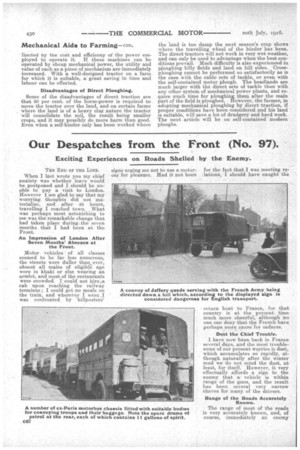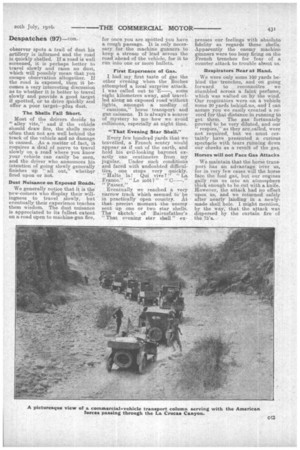Our Despatches from the Front (No. 97).
Page 12

Page 13

If you've noticed an error in this article please click here to report it so we can fix it.
Exciting Experiences on Roads Shelled by the Enemy.
THE END OF THE LINE.
When I list wrote you my chief anxiety was whether leave would be postponed and I should be unable to pay a. visit to London. However I am glad to say that my worrying thoughts did not materialize, and after 48 hours, travelling I reached town. What was perhaps most astonishing to me was the remarkable change that had taken place during the seven months that I had been at the Front.
An Impression of London After Seven Months' Absence at the Front.
Motor vehicles of all classes seemed to be far less numerous, the streets were duller than ever, altruist all males of eligible age were in khaki or else wearing an armlet, and most of the restaurants were crowded. I could not hireo, cab upon reaching the railway terminus ; I could get no meals on the train, and -wherever I went ,I was confronted by 'billposters'
signs urging me not to use a motorcar for pleasure. Had it not been for the fact that I was meeting relations, I should have caught the
return boat to France, for that country is at the present time much more cheerful, although no one can deny that the French have perhaps more cause for sadness.
Dust the Chief Trouble.
I have now -been back in France several days, and the most troublesome of our present worries is dust, which accumulates so rapidly, -although naturally after the winter• mud we do not. mind the dust, atleast, for itself. However, it very effectually affords a sign to the enemy that a vehicle is within range of the guns, and the result has been several very narrow shaves for many of the drivers.
Range of the Roads Accurately Known.
The range of most of the roads is very accurately known, and, of course, immediately an enemy
observer spots a trail of dust his artillery is informed and the road is quickly shelled. If a road is well screened, it is perhaps better to travel slowly and raise no dust, which will possibly mean that you escape observation altogether. If the road is, exposed, then it becomes a very interesting discussion as to whether it is better to travel slowly and provide a good target if spotted, or to drive quickly and offer a poor target—plus dust. .
The Shells Fall Short.
. Most of the drivers decide to " alley vite," and if the vehicle should draw fire, the shells more often than not are well behind the track of the vehicle and nb damage is caused. As a matter of fact, it requires a deal of nerve to travel slowly on a road where you know your vehicle can easily be seen, and the driver who announces his intention of going slowly generally finishes up "all out,' whether fired upon or not.
Dust Nuisance on Exposed Roads.
We generally notice that it is the new-comers who display their willingness to travel slowly, but eventually their experience teaches them wisdom. The dust nuisance is appreciated to its fullest extent on a road open to machine-gun fire, for once you are spotted you have a rough passage. It is only necessary for the machine gunners to keep a stream of lead across the road, ahead of the vehicle, for it to run into one or more bullets.
First Experience of Gas.
I had my first taste of gas the other evening when the °Boches attempted a local surprise attack. I was called out to -E—, some eight kilometres away, and travelled along an exposed road without lights,. amongst a medley of " camions," horse transport and gun caissons. It is always a source of mystery to me how we •avoid collisions, especially at night time.
"That Evening Star Shell."
ETery few hundrsd yards that we travelled, a French sentry would appear as if out of the earth, and hold his evil-looking bayonet exactly one centimetre from my jugular. Under such conditions and faced with undoubted difficulties, one stops . very quickly. " nalte la! Qui vire I ' "La France." "Le mot " "0—." " Passes."
Eventually we reached a very narrow track which seemed to be in practically open country. At that precis,: moment the enemy sent up one or two star shells. The sketch • of Bairnsfather's "That evening star shell" ex
presses our feelings with absolute fidelity as regards these shells. Apparently the enemy machine gunners were too busy firing on the French trenches for fear of a counter attack to trouble about us.
Respirators Near at Hand.
We were only some 100 yards behind the trenches, and on going forward to reconnoitre we stumbled across a faint perfume, which was wafted on by the wind. Our respirators were on a vehicle some 20 yards belainthus, and I can assure you we easily created a record far that distance in running to get them. The gas fortunately proved to be very diluted, and our respies," as they are called, were not required, but we must certainly have presented a curious spectacle with tears running down our cheeks as a result of the gas.
Horses will not Face Gas Attacks
We maintain that the horse trans. port has an advantage Over us, for in very few cases will the horse face the foul gas but our engines gaily run us into an atmosphere thick enough to be cut with a knife. However, the attack had no effect upon us, and we returned safely after nearly landingin a newlymade shell hole. I might mention, by the way, that the attack was dispersed by the curtain fire of the 75's.






















